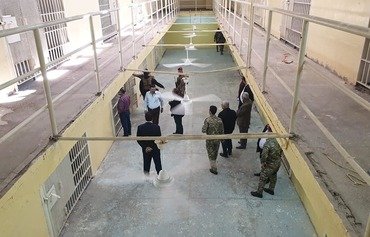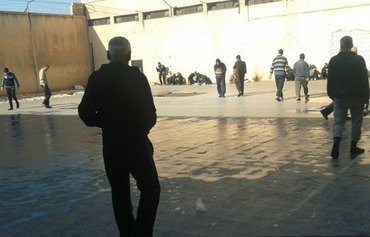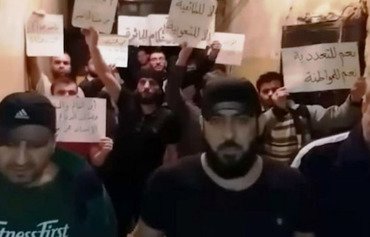The Iraqi government has been working to ensure that inmates in the country's prisons will not be a scourge to society upon their release by investing in programmes that seek to fundamentally change their way of thinking.
These programmes seek to rehabilitate prisoners serving out sentences of up to five years by offering them educational and religious guidance.
The Ministry of Justice, which oversees all Iraq's prisons, has set up guidance committees to engage with the inmates, regardless of the charges against them.
Commitment to human rights
At Iraq's largest prison -- al-Nasiriyah Correctional Prison in Dhi Qar province -- guidance committee members deliver lectures on moderate religious thinking in an attempt to positively influence the inmates.
![Iraqi inmates attend a literacy class. The Ministry of Justice ha been providing education and vocational training to inmates serving out their sentences in Iraqi prisons. [Photo courtesy of the Iraqi Ministry of Justice]](/cnmi_di/images/2018/04/19/12266-Iraq-prison-class-600_384.jpg)
Iraqi inmates attend a literacy class. The Ministry of Justice ha been providing education and vocational training to inmates serving out their sentences in Iraqi prisons. [Photo courtesy of the Iraqi Ministry of Justice]
Their frequent visits reveal the "high commitment to the application of human rights standards with all inmates, regardless of the charges against them", said Dhi Qar provincial council security committee chairman Jabbar al-Mousawi.
The prison's educational committees are working to change the beliefs of inmates who have embraced extremist ideologies, he told Diyaruna, with the goal of achieving true rehabilitation.
Iraqi society as a whole would benefit if prisons succeed in reforming criminals, he said.
While counseling and guidance may be futile with some of the prisoners, namely the senior leaders of terrorist groups and criminal gangs whose hands are stained with the blood of dozens, others can still be saved, he said.
Some prisoners were "deceived and misled by those [terror] groups", he said, and in these cases "rehabilitation and guidance in prison could produce positive results".
Vocational training in prison
The prison administration offers inmates vocational training in areas such as carpentry, sewing, barbery and car repair, al-Mousawi said.
"The aim of these workshops is to rehabilitate inmates to enable them to work upon release in order to re-engage with their communities and obtain a stable source of income," he said.
Participation has been high, he said, reflecting their "keenness to earn a living lawfully, after having tasted the bitterness of punishment in prisons".
Many took a wrong path out of financial hardship, he said, and these workshops can help them learn how to earn money outside of the realm of crime.
Al-Nasiriyah prison also has established special schools for inmates serving out sentences of up to five years, prison social researcher and director Murad al-Shmeisawi told Diyaruna.
These schools prepare the inmates to sit exams through which they can obtain certificates recognised by the Ministry of Education, he told Diyaruna.
Opportunities for re-integration
"The opening of schools inside prisons is part of showing respect for the human rights of inmates, including their right to learn and study," al-Shmeisawi said, noting that this "can create real opportunities to integrate them into society".
There have been a number of cases to date in which inmates have used their education certificates upon their release, he said, which has enabled them to begin an honorable life.
A number of inmates in Iraqi prisons are illiterate, said Abdul-Halim al-Husseini, an education researcher at the Ministry of Education.
Tutoring in prisons therefore begins at the most basic level, he told Diyaruna, with elementary and intermediate-level instruction also provided.

![The Iraqi government has formed special committees to engage with prisoners in an effort to steer them away from extremist thought. [Photos courtesy of the Iraqi Ministry of Justice]](/cnmi_di/images/2018/04/19/12265-Iraq-prison-inmates-600_384.jpg)







May God bless your efforts. I'm a religious guide with Kirkuk police command. I do visits to the juvenile department in coordination with a group of scholars from both waqfs.
Reply1 Comment(s)